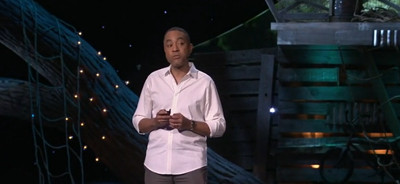If somebody from 1973 looked at what was on a dormitory message board in 1993,
如果一個1973年的人看著1993年一個學生宿舍信息欄,
the slang would have changed a little bit since the era of Love Story,
俚語等習慣用語會跟愛情故事時代有些不同,
but they would understand what was on that message board.
但是他們會看明白那個信息欄上的內容。

Take that person from 1993-not that long ago,
我們讓1993年的那個人-這可不算太久遠,
this is Bill and Ted's Excellent Adventure-those people.
那還是比爾和泰德歷險記時代,
Take those people and they read a very typical text written by a 20-year-old today.
我們讓這些人讀現在20歲年輕人寫的一段短信。
Often they would have no idea what half of it meant because a whole new language has developed among our young people doing something as mundane as what it looks like to us when they're batting around on their little devices.
他們應該通常連一半的內容都猜不出來,因為我們的年輕人已經發展出了一種新的語言,它是通過在孩子們的小設備上的看似平常的敲敲打打中演變出來的。
So in closing, if I could go into the future,
總結一下,如果我可以穿越到未來,
if I could go into 2033,
如果我去到2033年,
the first thing I would ask is whether David Simon had done a sequel to The Wire. I would want to know.
我會問的第一個問題就是大衛?西蒙拍沒拍火線的續集。
And I really would ask that and then I'd want to know actually what was going on on Downton Abbey.
我真的會問這個的,我還會想知道唐頓莊園到底發生了什么。
That'd be the second thing.
這是第二個問題。
And then the third thing would be,
第三個問題就是,
please show me a sheaf of texts written by 16-year-old girls,
請給我一疊16歲姑娘們寫的短信,
because I would want to know where this language had developed since our times,
因為我想知道這個語言已經發展成什么樣子了,
and ideally I would then send them back to you and me now so we could examine this linguistic miracle happening right under our noses.
更好的就是我可以把這些短信發給現在的大家和我,我們就可以研究研究這個當下正在發生著的語言奇跡。
Thank you very much.
非常感謝。
Thank you.
謝謝大家。











